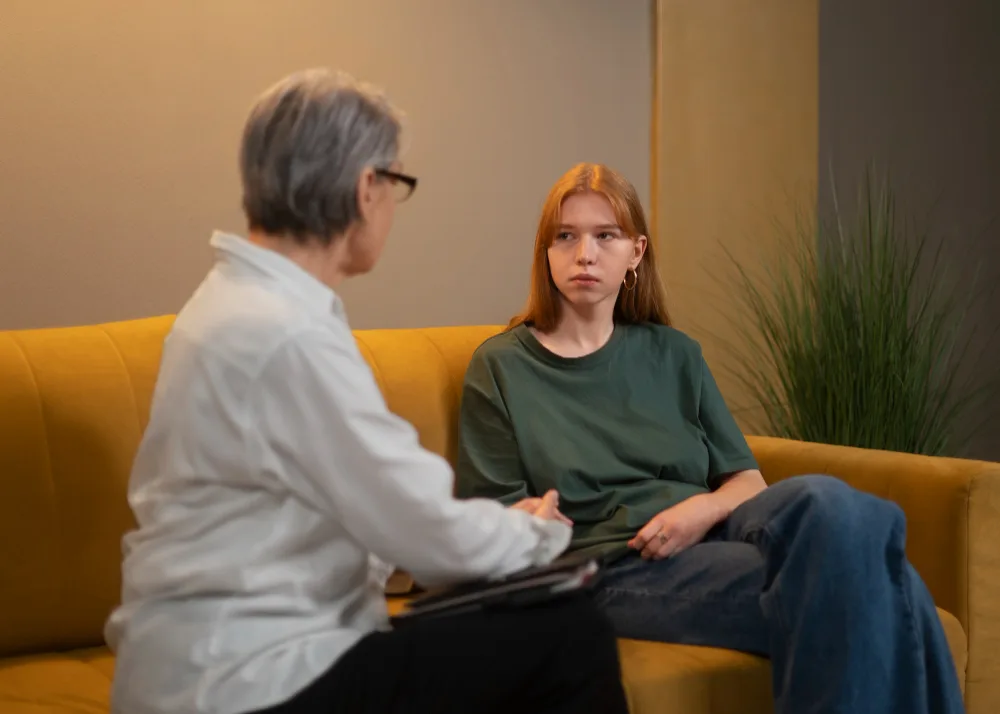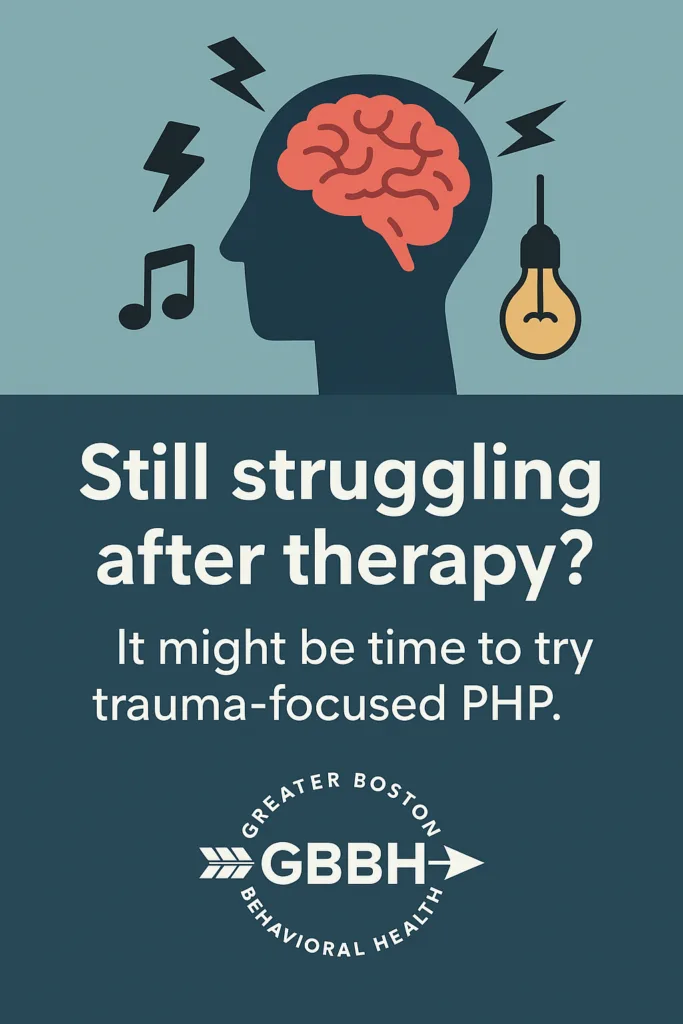Sometimes, therapy helps—but only to a point.
You’ve done the work. You’ve shown up to sessions, learned the terms, built insight. But beneath it all, the symptoms haven’t really gone away. Panic still hits when you least expect it. Sleep is fragile. Trust feels hard. And the coping skills that work for other people just don’t touch the heaviness you carry.
If this sounds familiar, you’re not alone—and it doesn’t mean therapy has failed. It means you might need a trauma therapy program that’s more intensive, more specialized, and more responsive to the depth of what you’re carrying.
At Greater Boston Behavioral Health, our trauma-focused PHP (Partial Hospitalization Program) offers exactly that.
When Weekly Therapy Isn’t Enough
Standard outpatient therapy can be life-changing—but it’s not always enough for people navigating complex trauma or chronic emotional dysregulation.
If your trauma responses are entrenched, your nervous system may need more than an hour a week to begin healing. You may feel like you’re constantly managing symptoms in isolation, with little time to process before the next crisis hits.
Signs you may need more support include:
- Repeated panic attacks or emotional flooding
- Dissociation or blanking out during stress
- Ongoing suicidal thoughts or hopelessness
- High-functioning exterior masking internal collapse
- Difficulty applying coping tools outside of session
This doesn’t mean you’ve failed therapy. It means your trauma deserves care that matches its intensity.
What Is a Trauma-Focused PHP?
A Partial Hospitalization Program (PHP) is a structured, daytime treatment model that provides intensive care—without requiring an overnight stay.
In a trauma-focused PHP, you’ll attend programming five days a week for several hours each day. You’ll work with a multidisciplinary team trained in trauma treatment, including:
- Licensed therapists
- Psychiatrists or nurse practitioners
- Trauma-informed group facilitators
- Case managers
This team approach ensures your care is consistent, comprehensive, and customized to your specific trauma history and goals.
You’ll also receive evidence-based therapies designed for trauma recovery, including:
- Cognitive Behavioral Therapy (CBT)
- Dialectical Behavior Therapy (DBT)
- EMDR or other trauma-processing models (based on availability)
- Psychoeducation on the nervous system and trauma response
- Skills for grounding, distress tolerance, and emotion regulation
Why Trauma-Specific Care Matters
General mental health treatment can sometimes overlook the complexities of trauma. Trauma isn’t just a memory—it’s a body-based experience that affects how you think, feel, and relate to others every day.
Our trauma therapy program in Boston focuses on:
- Safety and stabilization first—so you’re not re-triggered by the process
- Helping you name and recognize trauma symptoms (even if you’ve minimized them)
- Addressing shame, self-blame, and patterns of internalized fear
- Creating a structured container for the hard work of healing
You don’t have to relive every memory to begin healing—but you do need a setting that knows how trauma works.
Who Is PHP For?
You might benefit from trauma-focused PHP if:
- You’ve tried outpatient therapy but symptoms persist
- Your trauma symptoms interfere with daily life or safety
- You need more than once-a-week support, but don’t need 24/7 inpatient care
- You want to take your healing seriously in a structured, clinical environment
- You’re ready for change—but want to move at a pace that feels safe
PHP is often the right next step for people who are self-aware, motivated, and ready to dig deeper—especially if past therapy didn’t fully resolve what they were hoping it would.
What Makes Our Program Different
At Greater Boston Behavioral Health, our trauma therapy program is designed for people who value clarity, safety, and results. We know how exhausting it is to feel like you’re doing everything “right” but still suffering.
That’s why we’ve built a PHP that offers:
- Transparent treatment planning
- Trauma-informed staff who take you seriously
- Predictable structure with room for emotional flexibility
- Clinically grounded but deeply human care
We treat trauma not as a broken part of you, but as a survival adaptation—and help you slowly move from surviving to living.
Located in the heart of Boston, MA, our program combines clinical excellence with a warm, welcoming environment.
How to Get Started
Many people who start PHP at our center have one thing in common: they’ve already tried therapy. And they’re ready to go deeper.
If that’s where you are, you don’t have to figure it out alone. We’ll walk you through each step—from initial assessment to individualized treatment planning.
FAQ: Trauma-Focused PHP
What’s the difference between PHP and outpatient therapy?
Outpatient therapy usually involves weekly 1:1 sessions. PHP is a more intensive level of care—typically 5 days a week for several hours each day. It offers multiple therapy modalities, group sessions, and psychiatric support.
Will I have to talk about my trauma in detail?
Not at first. Trauma-focused PHP starts with stabilization. You’ll never be pushed to share more than you’re ready to. The focus is on safety, regulation, and trust.
Can I keep my job while in PHP?
Some people adjust work schedules or take short-term leave to attend PHP. We can help you explore options and provide documentation if needed.
Do you offer virtual trauma therapy programs?
Our PHP is currently offered in-person in Boston, MA to ensure the highest level of support. For those needing flexibility, we also offer other outpatient options.
What if I’ve already done PHP somewhere else?
We welcome clients who’ve tried treatment before. If it wasn’t the right fit, that’s not your fault. We’ll meet you where you are and build something different.
Your Trauma Deserves More Than Just Survival
If you’ve reached the edge of what traditional therapy can do, it doesn’t mean your healing is over. It means it’s time for care that’s as serious, thoughtful, and persistent as you are.
Ready to explore our trauma therapy program in Boston? Call us today at (888) 301-8072.
At Greater Boston Behavioral Health, we’re here to help you find safety, stability, and a path forward—at your pace, and on your terms.


